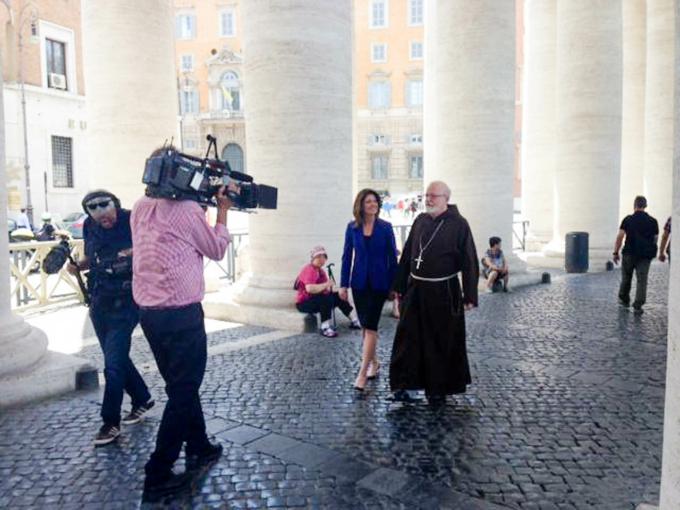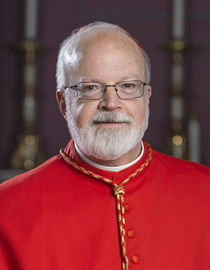
Culture
From the beginning of the process I was aware that the questions would not be about the weather and the Red Sox.

O'Malley
Last Sunday evening I was privileged to be featured on the CBS television program "60 Minutes," which is actually three 20 minute segments. I was featured in segment two of the broadcast. The whole experience was fascinating. I was very impressed by the entire team, their work ethic, professionalism and dedication. Those 20 minutes are distilled out of many hours of hard work. Correspondent Norah O'Donnell and producers Frank Devine and Magalie Laguerre --Wilkinson are all Catholics. Their faith and their regard for the Church was evident. Frank is a very well-informed Catholic who can engage in theological debate about "internal form" or any aspect of the life of the Church.
From the beginning of the process I was aware that the questions would not be about the weather and the Red Sox. The program's interviews include difficult questions that are often on many people's minds. For some people, being featured on 60 Minutes would be exhilarating, but television interviews are not at the top of my list of favorite things to do. Newscasts these days can be about sound bites and quick messaging. In contrast, 60 Minutes does a good job of trying to go deeper into the topics they address. My interview touched on three provocative issues that are seldom addressed by members of the hierarchy, but which once raised capture everyone's attention. These matters call for more time and consideration than can be given in a 20 minute broadcast segment.
Not surprisingly, Norah asked a question about Bishop Robert Finn of the Diocese of St. Joseph-Kansas City and accountability. While it is the case that the sexual abuse policies adopted by the U.S. Conference of Catholic Bishops would preclude someone convicted of not reporting a crime from teaching religious education or having any position supervising children, some of the advance reporting about this matter did not reflect the nuances of my answer to the question. In response to Norah, I said that the Vatican must attend to this situation. The Holy Father is aware of this need, and recently an Episcopal Visitator was sent to Bishop Finn's diocese. The Holy See had the sensitivity to send a Canadian bishop to conduct the visitation.
One of the significant concerns of the members of the Pontifical Commission for the Protection of Children, on which I serve as President, is the accountability of bishops. We are all aware that Catholics want their leaders to be held accountable for the safety of children, but the accountability has been sporadic. We need clear protocols that will replace the improvisation and inertia that has often been the response in these matters. Bishops also deserve due process that allows them to have an opportunity for a fair hearing. The situation in the Diocese of St. Joseph-Kansas City is a painful one; we pray that the visitation will help. After all that American Catholics have been through in the past decade, survivors and the community at large understandably are demanding transparency and accountability. As a Church, the safety of children must be our priority. At the same time, we need to provide justice for all and avoid crowd-based condemnations.
Another topic that has garnered much attention is the recent visitation of Leadership Conference of Women Religious (LCWR) and the communities of religious women. These were two different activities, conducted by distinct Roman congregations. I trust that there were serious concerns that gave rise to the visitations, but it would seem that better planning and a wider participation of American religious and U.S. bishops would have been helpful. The Church personnel who carried out these assignments have done an admirable job under very difficult circumstances. Unfortunately, many religious women have been alienated by the process and the bishops in this country have been blamed for shortfalls in communications and the process. Hopefully when the final report of the visitations is presented, it will be a more positive experience that will contribute to healing in our Church and be helpful for the cause of religious life. The upcoming Year of Consecrated Life called for by Pope Francis will be an opportunity to celebrate the great achievements of our religious and introduce a new generation of Catholics to consecrated life and its many opportunities to accomplish good works in the name of the Church.
A topic also of significant concern in the Church that was addressed during the interview is the discussion concerning the ordination of women to the priesthood. This is particularly painful to many Catholic women who feel that the teaching on women's ordination is a rejection and unfair.
Throughout history, many wonderful Catholic women have wished to be priests, among them St. Therese, the Little Flower. In my comments I was trying to communicate that women are often holier, smarter and more hard-working than men, and that the most important member of the Church is a woman, the Blessed Virgin Mary. The Church is called to be faithful to Christ's will, and that is not always easy or popular. Understanding the Church's teaching is always a process that begins with faith.
As a person who is just an occasional viewer of television, I am amazed to learn of the number of people who watch 60 Minutes each week; this is certainly a credit to the quality of the program. I hope that one take-away from my 60 Minutes interview will be that cardinals, bishops and priests are human, and that we love the Church.
- Cardinal Seán P. O'Malley, OFM Cap. Is Archbishop of Boston
Recent articles in the Culture & Events section
-
'Dignitas' and the mediaRussell Shaw
-
Scripture Reflection for April 14, 2024, Third Sunday of EasterDeacon Greg Kandra
-
St. Helena's House is established in the South EndThomas Lester
-
Is this synodality?Russell Shaw
-
Poking the hornet's nest of IVFFather Tadeusz Pacholczyk


















